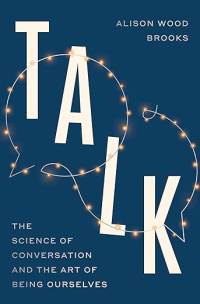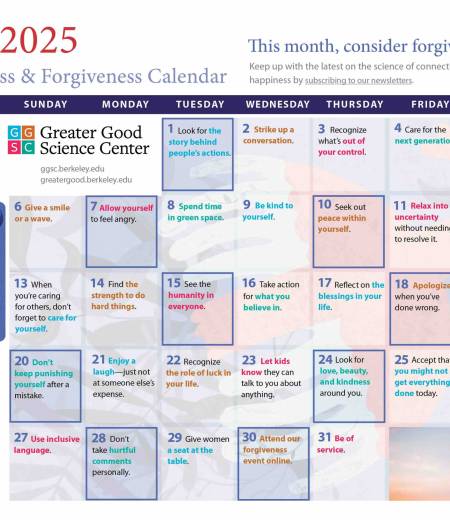As humans, we’re talking to each other constantly. With all that practice, we must be pretty good at it—right?

Not exactly. As a professor at Harvard Business School and author of Talk: The Science of Conversation and the Art of Being Ourselves, Alison Wood Brooks teaches people how to have better conversations. She also debunks the widespread myths and assumptions that cause us to have less-than-stellar interactions. In fact, many of our intuitions about how to talk to each other can create awkwardness, misunderstandings, and missed opportunities.
As Brooks explains, conversation is a skill, and research findings have a lot to say about how we can become better at it so our conversations are more enjoyable, more productive, and better at bringing us closer together.
Here are 10 fascinating findings from Brooks’s book for you to keep in mind the next time you’re getting ready to chat with another human.
1. Preparing topics in advance makes conversations better
Do you think about what you’re going to discuss with people in advance? Research by Brooks and her colleagues suggests that only about 18% of us actually prepare topics for conversations, and half of us believe that doing so will make conversations less enjoyable.
But even spending 30 seconds planning some talking points makes conversations more fluid, with less awkward transitions, fewer pauses, and less umm-ing and uhh-ing, her research suggests. It also makes people feel less anxious and more confident.
In Brooks’s Harvard classroom, her students often worry that prepping topics is embarrassing, manipulative, or just plain unnecessary—but year after year, they reliably find conversations about prepared topics to be more fun.
Preparing topics doesn’t mean we need to be rigid about making sure to discuss each one. It just gives us an insurance policy for when conversation falters, and it can help us drift toward more meaningful discussions rather than defaulting to the often easy, concrete topics that spring to our minds in the moment.
2. Our intuitions about which topics make for rewarding conversation are wrong
Brooks and her colleague Mike Yeomans gave 1,000 people a list of 50 topics to rate which would be best for conversation—from favorite books to grief and loss to a perfect day—and then had people actually dive in to those topics. The conversations that people ended up enjoying were not the ones they predicted. For example, “When did you last cry in front of another person?”—anticipated as the second least enjoyable topic—was, in practice, highly enjoyable to discuss.
“It’s almost impossible to tell in advance whether a conversation topic will be good or bad,” Brooks writes.
3. Switching topics more frequently makes conversations more enjoyable
In a study by Brooks and her colleagues, pairs of strangers either had conversations as they normally would or tried to get through 12 topics in 10 minutes. At the end of the day, those who tried to cover more ground enjoyed their conversations more—a bump from 5 to 6 on a scale of 7. And, surprisingly, their conversations didn’t seem to lack depth.
In other research of 30-minute conversations online, more people thought they had discussed too few topics rather than too many—20% vs. 11%. Any hesitancy that we feel in the moment about changing the subject may be misguided.
4. People who ask questions are more likable
In a 2017 study by Brooks and her colleagues, people who asked more questions in a 15-minute conversation were better liked by their conversation partners. Similarly, in four-minute speed-dating conversations, singles who asked more follow-up questions were more likely to get a second date—and no one ever got to the point of asking “too many” questions.
 Talk: The Science of Conversation and the Art of Being Ourselves (Crown, 2025, 336 pages).
Talk: The Science of Conversation and the Art of Being Ourselves (Crown, 2025, 336 pages).
If you think you’re already a great question-asker, think again: According to Brooks’s research, friends and daters both overestimated how many questions they asked in conversations.
And if you’re hesitant to ask certain questions that you might be curious about, you can relax a little: A 2021 study found that being asked sensitive questions—about affairs, abortion, or money—didn’t make conversations unenjoyable or cause people to form bad impressions of the question-asker compared to more mundane questions.
One caveat is to beware of what Brooks calls “boomerasking”: posing a question simply because you want to answer it yourself, like “How was your weekend?” when you have an amazing Saturday-night story to tell. Her 2025 study finds that these kinds of questions make us appear insincere, egocentric, and uninterested in our conversation partner.
5. We’re more hesitant to make jokes than we should be
Another 2017 study by Brooks and her colleagues finds that we think humor goes wrong more often than it actually does. “People underestimate how often attempts at humor go well—leavening the mood, drawing people closer, boosting perceptions of competence and status,” she writes.
When Brooks asked her students to record a conversation with “their favorite person in the world to talk to,” nearly all of those favorite people used a staple of the comedy toolkit: the call-back. Call-backs are references to a topic from earlier in the conversation or earlier in the relationship, a kind of marker of shared memory and often a little inside joke.
6. We underestimate the power of compliments
In a 2021 study, researchers asked students what they thought about giving random compliments to strangers, then actually sent them out to say nice things to others on campus. The students were nervous; they thought they wouldn’t be very good at giving compliments, and they worried that people might be bothered and uncomfortable.
In reality, their worries were overblown, and they also underestimated how good it felt to receive a compliment. While Brooks cautions against giving compliments on people’s physical appearance unless you know they’ll appreciate it, she highly recommends complimenting others on things you admire about them.
7. Apologies make us look good
One study by Brooks and her colleagues found that apologies make us seem more trustworthy. When people apologized for the rain (a “superfluous” apology) before asking a stranger to borrow their phone, 47% said yes—compared to 9% without an apology. In other experiments, they found that people who make these superfluous apologies for traffic or bad luck are also seen as more likable.
And in the realm of more substantive apologies, Brooks writes, doctors who apologize for their mistakes to patients and families are less likely to be sued. It turns out that taking responsibility is a good look.
8. We think we understand each other more than we do
A 2022 study found that when someone asked an ambiguous question in a conversation, both people thought that its real meaning was understood 70% of the time or more, when they were actually on the same page only 44% of the time. Oddly, participants still overestimated their shared understanding when they were speaking totally different languages, believing that meaning could be inferred simply from tone of voice.
Brooks quotes playwright George Bernard Shaw in her book: “The single biggest problem with communication is the illusion that it has taken place.”
9. We have a hard time believing that people who disagree with us are actually listening
We often learn more from conversations than we expect to—and while the same thing is happening for other people, we don’t seem to realize it.
For example, if someone disagrees with us, we have a tendency to think they must not be listening very well. Even when people acknowledge and show respect for our perspective, and can articulate it clearly, we evaluate them as worse listeners if they disagree with our point of view compared to people who agree.
And our assumptions about the other person affect how we act, too, Brooks says, potentially contributing to today’s social and political polarization. “If you think people are out to persuade you (rather than learn from you), you will behave in ways that are more likely to lead to conflict, which inhibits actual learning and escalates discord.”
10. Conversations rarely end when anyone wants them to
If you’re itching to get off the phone with a family member or worried that you’re taking up too much of someone’s time, you’re not alone. According to a 2021 study of 932 conversations, conversations don’t tend to end when both people want them to—or, for that matter, even when one person wants them to.
In general, we aren’t very aware of when our interlocutor wants to leave, and we underestimate how different the other person’s preference is from ours. “Ending conversations is a classic ‘coordination problem’ that humans are unable to solve because doing so requires information that they normally keep from each other,” the researchers conclude.







Comments